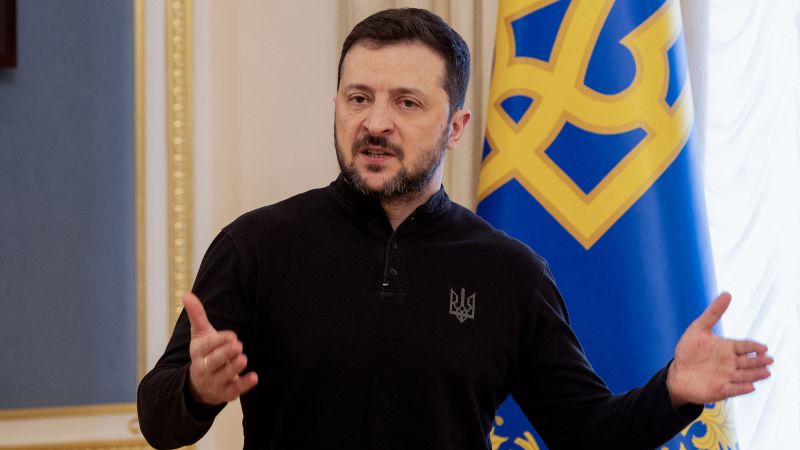
Zelensky Criticizes Trump for Misleading Claims About Ukraine War
Ukrainian President Volodymyr Zelensky has publicly rebuked former U.S. President Donald Trump for spreading false information, following Trump’s erroneous assertion that Ukraine instigated the conflict with Russia. Zelensky’s remarks mark one of the most significant public exchanges of allegations between Kyiv and Washington since the onset of the full-scale war nearly three years ago.
During a press conference in Kyiv, Zelensky refuted a series of unfounded allegations made by Trump, emphasizing that any resolution to the conflict requires Ukraine’s active participation. “Unfortunately, President Trump – while I deeply respect him as a leader representing a nation we hold in high regard, the American people – seems to reside in a realm of disinformation,” Zelensky stated.
Trump has expressed a desire for a swift end to the war, even hinting at the possibility of Ukraine experiencing further territorial losses. Alarmingly, he has occasionally aligned himself with the Kremlin’s narrative, blaming Ukraine and NATO for the ongoing conflict. He has provocatively suggested that Ukraine "may one day be Russian."
The nature of Trump’s relationship with Russia appears to go beyond mere dialogue. Last week, he drew attention for opting to have an informal discussion with Russian President Vladimir Putin for 90 minutes before addressing Zelensky.
On Tuesday, U.S. and Russian officials engaged in high-level discussions regarding the conflict in Ukraine in Riyadh, Saudi Arabia, without including Ukrainian representatives. Both parties agreed to form high-level teams aimed at negotiating a resolution to the war while working to reestablish diplomatic communications.
Zelensky expressed discontent over Ukraine’s exclusion from the talks, indicating that while it is a sovereign right for any nation to engage in discussions with Saudi Arabia, the U.S. direct talks with Russia essentially serve to ease Putin’s prolonged isolation.
Historically, under the Biden administration, the U.S. became one of Ukraine’s staunchest allies, offering substantial military assistance. Trump, however, has argued that America should cease aid to Ukraine unless it receives tangible benefits in return. Earlier this month, he proposed that the U.S. seek access to Ukraine’s abundant mineral resources in return for future assistance. Zelensky refuted this notion, claiming that the U.S. requested Ukraine to "hand over" 50% of its rare minerals without offering any security assurances. “I cannot, I will not trade our state,” he affirmed.
Zelensky’s initial complaint about his country being excluded from the negotiations prompted Trump’s unfounded outburst on Tuesday. In his statement, Trump remarked, “Today I heard, ‘Oh well, we weren’t invited’—you’ve been there for three years. You should have ended it long ago.”
The accusation that Ukraine was the originator of the war has repeatedly been echoed by the Kremlin. The conflict began in 2014 when Russia unlawfully annexed Crimea and began supporting pro-Russian separatists in eastern Ukraine. This escalated further when Moscow launched a full-scale invasion of Ukraine in February 2022, attacking under the cover of night and bombarding Ukrainian cities in an effort to destabilize the government.
Trump’s comments have been met with widespread indignation in Ukraine, with many citizens questioning the reliability of the former president. Psychologist Valeria Valevska, interviewed in Kyiv, remarked, “I believe Trump is impulsive, unpredictable, and Ukrainians cannot rely on his support at all. Most Ukrainians and Europeans share my sentiment.”
Pensioner Oleksandr Mykhailov added that Trump “clearly doesn’t comprehend the situation.” He voiced a concern that if this continues, Europe must intervene and establish its own conditions. “Whenever America has intervened, they have left destruction behind, like in Afghanistan and Iraq,” he noted.
Despite the conflicting narratives, Trump’s remarks were praised in Moscow. Russian Foreign Minister Sergey Lavrov expressed admiration for Trump’s alignment with the Kremlin’s perspective, stating that Trump seemed to comprehend Russia’s viewpoint regarding the conflict, particularly criticizing previous U.S. efforts to expand NATO.
While Trump raised questions about the legitimacy of Zelensky’s government, inaccurately asserting that elections had not occurred in Ukraine amid martial law, Zelensky won over 73% of the vote in the second round of the 2019 presidential election. Elections have been suspended since the onset of Russia’s unprovoked invasion.
Interviewees in Kyiv suggested that calls for new elections might be under Russian influence, aimed at weakening Ukraine’s position. Zelensky stressed that claims surrounding his approval ratings stem from Russian propaganda, asserting that recent polls indicate his popularity remains above 50%.
The historical context of Trump and Zelensky’s relationship further complicates the current situation; Trump had previously faced impeachment after pressuring Zelensky to investigate his political opponent, Joe Biden, in a controversial phone call.
As the situation evolves, the dialogue between Ukraine and the U.S. remains crucial for both nations’ futures and for international stability.









